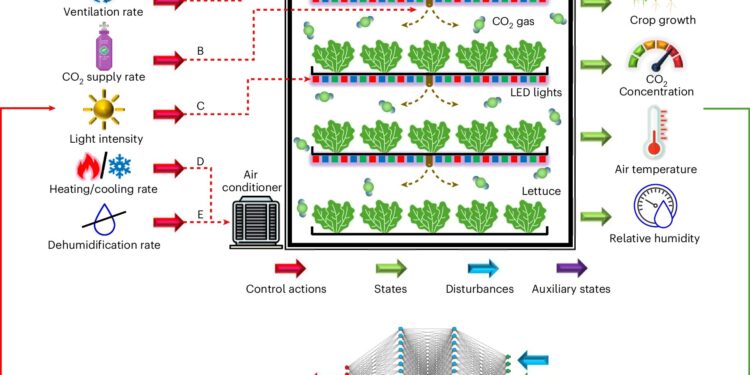Schematic of a PFAL with DRL for lettuce production. Credit: Natural food (2024). DOI: 10.1038/s43016-024-01045-3
Integrating artificial intelligence into current environmental control systems could reduce energy consumption in indoor farming by 25 percent, potentially helping to feed the planet as its population grows, Cornell engineers have found.
“If we integrate AI into agricultural factories—large-scale indoor farms with complete control of lighting and climate control—anywhere in the world, we can facilitate photosynthesis, transpiration, and respiration of crops in these buildings,” said Benjamin Decardi-Nelson, a postdoctoral researcher in the lab of Fengqi You, the Roxanne E. and Michael J. Zak Professor of Energy Systems Engineering at Cornell Engineering. “We can expect to see substantial reductions in energy consumption while boosting efficiency and saving valuable resources.”
Their research, “Artificial intelligence can regulate lighting and climate systems to reduce energy consumption in factories and support sustainable food production,” appears in Natural food.
The world’s population is expected to reach 9.7 billion by 2050, according to the United Nations. This growth, combined with climate change and urbanization, requires addressing the flaws in current food production systems, the researchers said.
Indoor farming methods, such as plant factories with artificial lighting, are less vulnerable to climate change, but they are energy intensive and require careful resource management to be sustainable.
“Existing environmental control systems are not smart enough,” said You, who is co-director of the Cornell Institute for Digital Agriculture and co-director of the Cornell University AI for Science Institute.
Ventilation can reduce energy consumption, but it complicates plant growth by affecting carbon dioxide levels and water balance. AI tools can help control methods take these criteria into account.
“Artificial intelligence offers a promising solution in managing several complexities,” Decardi-Nelson said.
Using AI techniques such as deep reinforcement learning and computational optimization, the scientists analyzed lettuce grown in indoor farming facilities in eight different locations across the United States — Los Angeles; Chicago; Miami; Seattle; Milwaukee; Phoenix; Fargo, North Dakota; and Ithaca, New York — as well as in Reykjavik, Iceland; and Dubai, United Arab Emirates.
AI reduces energy consumption by optimizing lighting and climate control systems. Energy consumption dropped from 9.5 to 6.42 kilowatt-hours per kilogram of fresh weight (the energy needed or used to produce one kilogram of lettuce grown indoors) in locations that did not use AI technology. The researchers found that in warmer regions like Dubai or southern climates in the United States, AI reduced energy consumption to 7.26 kilowatt-hours per kilogram of fresh weight, compared to 10.5 kilowatt-hours per kilogram of fresh weight.
Low ventilation during light periods (16 hours of simulated sunlight) and high ventilation during dark periods (eight hours simulating night) provided an energy-efficient solution for optimal indoor carbon dioxide levels for photosynthesis, oxygen for plant respiration and growth, and balanced other ventilation needs.
“It’s a very similar concept to smart homes,” You said. “We want to be comfortable at home while reducing our energy consumption, just like crops. This work focuses on a smart system to make food production optimal, sustainable and reduce the carbon footprint. That’s what AI does very well. We can save a lot if we use AI to carefully optimize artificial lighting and other energy systems.”
By streamlining operations using AI to reduce energy consumption, indoor farms become viable, Decardi-Nelson said, even in regions where energy-saving opportunities are limited.
“By strategically aligning environmental control system technology with plant biology,” Decardi-Nelson said, “energy can be conserved using ventilation while minimizing carbon dioxide waste and maintaining ideal growing conditions.”
More information:
Benjamin Decardi-Nelson et al, Artificial intelligence can regulate lighting and climate systems to reduce energy consumption in plant factories and support sustainable food production, Natural food (2024). DOI: 10.1038/s43016-024-01045-3
Provided by Cornell University
Quote: AI improves energy sustainability of indoor food production (2024, September 9) retrieved September 9, 2024 from
This document is subject to copyright. Apart from any fair dealing for the purpose of private study or research, no part may be reproduced without written permission. The content is provided for informational purposes only.



